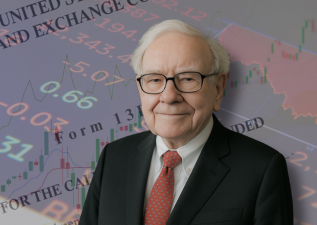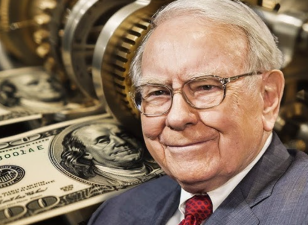In the investment world, every statement from Warren Buffett is a bombshell, capturing the attention of investors worldwide.
As the helmsman of Berkshire Hathaway, he draws on years of accumulated investment wisdom to possess profound and unique insights into the market. Recently, Buffett has delivered a series of thought-provoking remarks on various occasions. These remarks not only reveal accurate assessments of the current market situation but also provide valuable guidance for investors' decision-making.
A Review of Buffett's Statements
- Views on the Future of the US Stock Market
At the 2025 Berkshire Hathaway Annual Meeting, Buffett addressed the sharp drop in US stocks in the first quarter of 2025, which resulted in a $5 billion loss for Berkshire. He explicitly stated that 15% fluctuations are normal adjustments and that true investors should adapt to market cycles. He believes that current US stock valuations already imply overly high growth expectations, and that historic investment opportunities may emerge over the next five years. This isn't the first time Buffett has expressed a nonchalant attitude toward US stock market volatility; his view aligns closely with his value investing philosophy of "being greedy when others are fearful."
- Warnings on the Risks of the US Dollar
Buffett has repeatedly mentioned the risk of dollar devaluation, saying that if the government acts irresponsibly, the value of the currency will be "terrifying." He cited Berkshire's $26.8 billion tax payment in 2024, representing 5% of all US corporate taxes, as an example to warn that the US fiscal deficit is unsustainable. Monetizing the fiscal deficit could bring hidden costs, such as the evaporation of paper currency value due to policy errors. This deeply reflects his deep concerns about the creditworthiness of the US dollar.

Investment Views on Japanese Stocks
Buffett reiterated his bullishness on Japanese stocks, saying he would hold them for another 50 to 60 years. Berkshire currently holds $23.5 billion in shares in Japan's five largest trading companies, with dividend income far exceeding the cost of borrowing in yen. He has also hinted at the possibility of increasing his holdings to $100 billion. He believes that Japanese trading companies offer low valuations and stable cash flows. Their global networks create natural synergies with Berkshire's energy and logistics businesses. The cost-optimization benefits of such cross-cultural collaborations are often underestimated by the market.
Market Insights Behind the Statement
- The US Stock Market Outlook is Cloudy
Buffett's comments on the US stock market reveal numerous uncertainties. On the one hand, the US stock market has experienced a long period of growth, with the S&P 500's price-to-earnings ratio exceeding 30 times, reaching a near 20-year high. This suggests that market valuations are high, posing a certain risk of a bubble. Excessive valuations often indicate that investors have extremely high expectations for future corporate earnings growth. However, if corporate earnings fall short of expectations, stock prices could face a significant correction.
On the other hand, the macroeconomic environment also adds uncertainty to the US stock market outlook. Global economic growth faces certain pressures, and trade protectionism is on the rise. These factors could negatively impact the overseas expansion and profitability of US companies. Furthermore, the Federal Reserve's monetary policy direction is unpredictable, and interest rate fluctuations directly affect corporate financing costs and valuations. Against this backdrop, Buffett believes that investment opportunities may emerge over the next five years, suggesting that the US stock market may undergo a period of correction, creating an entry point for value investors.
- A dollar crisis is sounding
As the world's primary reserve currency, the stability of the US dollar is crucial to global financial markets. Buffett's warning about the risk of dollar devaluation is not unfounded. The US's continuously rising fiscal deficit is a key concern. In fiscal year 2024, the federal deficit exceeded $1.2 trillion, accounting for over 5% of GDP. To offset the deficit, the government may resort to measures such as issuing more money, which would undoubtedly increase the supply of dollars and, in turn, cause the dollar to depreciate.
If the dollar depreciates, investors and countries holding large amounts of dollar assets will be the first to be impacted, as the value of their assets will decrease. Secondly, since most global commodities are priced in US dollars, a depreciation of the dollar would lead to rising commodity prices, triggering imported inflation and undermining the economic stability of various countries. Furthermore, a depreciation of the dollar could weaken its dominant position in the international monetary system, prompting countries to seek alternative currencies or assets, and destabilizing the global financial market.

Japan's Unique Investment Login
Buffett's continued optimism about Japanese stocks is based on solid logic. From a valuation perspective, some Japanese companies, particularly the five major trading companies in which he has invested, enjoy relatively low valuations. This means that, given the same level of profitability, investors can purchase their shares at lower prices, potentially generating higher returns.
In terms of cash flow, these trading companies boast robust cash flow, providing a solid foundation for continued operations and growth. Even in challenging economic times, they maintain sufficient funds to weather various challenges and maintain profitability and dividend payments. Furthermore, the synergies between the Japanese trading companies' global network and Berkshire Hathaway's own businesses are a major highlight. Through collaboration, both parties can leverage their complementary strengths in resource sharing and market expansion, reducing operating costs and enhancing overall competitiveness. This synergistic value is under-tapped in the market and is precisely the investment potential that Buffett values.
